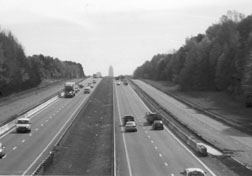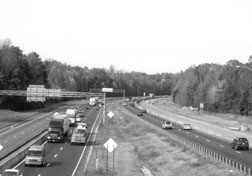U.S. Department of Transportation
Federal Highway Administration
1200 New Jersey Avenue, SE
Washington, DC 20590
202-366-4000
Focus
| Accelerating Infrastructure Innovations |
Publication Number: FHWA-RD-03-016
Date: April 2003
New regulations released by the Federal Highway Administration (FHWA) in December 2002 now allow the use of design-build contracting for transportation infrastructure projects that are part of the Federal-aid highway program. "This innovative technique has the potential to save State highway agencies both time and money," says Jerry Yakowenko of FHWA.
The design-build method assigns both design and construction responsibilities to one firm, allowing some construction work to begin before the design is completed. This compares to the traditional design-bid-build method, where the design and construction aspects of the project are bid separately. Design-build contracting often reduces a highway agency's administration and inspection costs and can reduce or eliminate change orders and claims resulting from errors and omissions during construction. Design-build also allows contractors increased flexibility in selecting innovative designs, materials, and construction techniques.
FHWA's final rule on design-build contracting, which was required by the Transportation Equity Act for the 21st Century (TEA-21), was published in the December 10, 2002, Federal Register. A copy of the rule can be found at www.access.gpo.gov/su_docs/fedreg/a021210c.html. Prior to TEA-21, the design-build method did not fully comply with the existing FHWA statutes for design and construction. However, States did evaluate the design-build method through FHWA's Special Experimental Project Number 14 (SEP-14). Under SEP-14, 25 States and several local agencies have evaluated more than 300 design-build projects over the last 10 years.
Using the design-build method, the Utah Department of Transportation (DOT) completed its $1.35 billion reconstruction of Interstate 15 under budget and 3 months ahead of schedule. The six-lane highway, which is the primary north-south road in Salt Lake City, was rebuilt with eight lanes and more than 140 bridges. The project was finished in 4.5 years, in time for the 2002 Winter Olympic Games, and saved at least 4 years compared to using traditional contracting methods.
 |
 |
| The North Carolina DOT's current design-build projects include the widening of Interstate 77 in Charlotte. | |
In the past 4 years, the Arizona Department of Transportation (ADOT) has used design-build on three large reconstruction projects on Interstate 17, State Route 68, and US 60. The $80 million I-17 project involved widening an 11.26-km (7-mi) section of freeway, reconstructing 24 ramps and 2 traffic interchanges, and overlaying 22.5 km (14 mi) of frontage road. On State Route 68, 22 km (13.7 mi) of road were reconstructed, a 3.2-km (2-mi) section was realigned, and new bridges and wildlife crossings were added. And on US 60, a 20-km (13-mi) stretch of the road and six bridges were widened and a new High Occupancy Vehicle (HOV) flyover bridge added at the interchange of US 60 and Interstate 10.
|
Design-Build and Value Engineering A 1995 Congressional regulation mandated that a value engineering (VE) analysis be performed for all Federal-aid highway projects of $25 million or more. In the case of design-build highway projects, the new FHWA rule published in the Federal Register in December 2002 stipulates that the VE analysis must be carried out prior to releasing a Request for Proposals. To perform a VE analysis, the transportation agency reviews the project's features and looks for ways to improve quality, foster innovation, and control costs. A VE job plan typically includes a number of different phases, such as:
In fiscal year 2001, States collectively saved more than $932 million as a result of performing VE studies. "Value engineering has proved to be a highly cost-effective means of increasing productivity and improving the quality of highway construction," said FHWA Administrator Mary E. Peters. For more information on VE, contact Donald Jackson, FHWA's VE coordinator, at 202-366-4630 (fax: 202-366- 3988; email: donald.jackson@fhwa.dot.gov). |
Using design-build for these projects saved 450 days, $12.59 million in project costs, and an estimated $27.6 million in motorist delay costs. Overall, Arizona found design-build to be a faster, better, and cheaper process. "Design-build proved to be extremely beneficial," says Debra Brisk of ADOT. "Road users were not inconvenienced as much and quality was not jeopardized." As ADOT considers future design-build projects, a team comprised of ADOT staff and representatives from the Arizona General Contractors Association and Arizona Consulting Engineering Association will look at ways to refine and improve the design-build process, such as by coordinating more with utility companies and providing clearer quality control/quality assurance specifications.
The North Carolina DOT has five design-build projects underway, including the widening of Interstate 77 in Charlotte. One hurdle to overcome in introducing design-build to the State was concern by contractors that projects would be bundled together and bid as very large contracts. It also meant a cultural change within the DOT regarding how projects were to be done. Having overcome these challenges, the projects are now proceeding successfully. "We are seeing a range of benefits, including increased opportunity for innovation, aggressive scheduling, and quality equal to or better than that resulting from general contracting practices," says Steve DeWitt of North Carolina DOT. The DOT currently has authority from the State legislature to carry out up to 10 design-build projects a year; this number will increase to 25 projects next year. The scope of projects ranges from those costing a few million dollars to those carrying a price tag of more than $150 million, helping to allay contractors' concerns about the bundling of projects.
The Florida DOT started using design-build in 1988 and in the past fiscal year awarded about $509 million in design-build contracts, for a total of 49 projects, as part of a State economic stimulus package. "Design-build allowed Florida DOT to accelerate the letting of projects and reduce the overall design and construction time. Design-build cuts about 30 percent off the time needed to complete the project. It's a big savings and it has caught the eye of the public. They want us to get in and get out as quickly as possible," says Brian Blanchard of Florida DOT. Using design-build also reduces administration and inspection costs for the agency, as there are fewer contracts to manage. "Contractors have accepted design-build as long as we pick projects that minimize their risk," says Blanchard. "We don't want to pick projects that have a lot of unforeseen conditions that could drive up their costs."
For more information on design-build contracting, contact Jerry Yakowenko at FHWA, 202-366-1562 (fax: 202-366-3988; email: gerald.yakowenko@fhwa.dot.gov). For more information on design-build projects in Arizona, Florida, North Carolina, and Utah, see below.
|
State Contacts Arizona DOT -Debra Brisk 602-712-7550 (fax: 602-712-6941; email: dbrisk@dot.state.az.us) Florida DOT -Brian Blanchard 850-414-4377 (fax: 850-922-9293; email: brian.blanchard@dot.state.fl.us) North Carolina DOT -Steve DeWitt 919-733-2210 (fax: 919-733-8441; email: sdewitt@dot.state.nc.us) Utah DOT -Bob Dyer 801-965-4384 (fax: 801-965-4564; email: rdyer@utah.gov) |